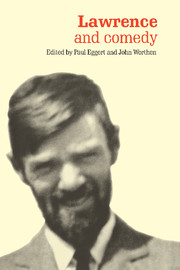Book contents
- Frontmatter
- Contents
- Note on contributors
- Acknowledgements
- Cue-titles
- Introduction
- 1 Drama and mimicry in Lawrence
- 2 Mischief or merriment, amazement and amusement – and malice: Women in Love
- 3 Comedy and hysteria in Aaron's Rod
- 4 D. H. Lawrence and his ‘gentle reader’: The furious comedy of Mr Noon
- 5 ‘Homunculus stirs’: Masculinity and the mock-heroic in Birds, Beasts and Flowers
- 6 Comedy and provisionality: Lawrence's address to his audience and material in his Australian novels
- 7 Lawrence's satiric style: Language and voice in St. Mawr
- 8 Humour in the letters of D. H. Lawrence
- 9 Lawrence to Larkin: A changed perspective
- Index
5 - ‘Homunculus stirs’: Masculinity and the mock-heroic in Birds, Beasts and Flowers
Published online by Cambridge University Press: 01 March 2010
- Frontmatter
- Contents
- Note on contributors
- Acknowledgements
- Cue-titles
- Introduction
- 1 Drama and mimicry in Lawrence
- 2 Mischief or merriment, amazement and amusement – and malice: Women in Love
- 3 Comedy and hysteria in Aaron's Rod
- 4 D. H. Lawrence and his ‘gentle reader’: The furious comedy of Mr Noon
- 5 ‘Homunculus stirs’: Masculinity and the mock-heroic in Birds, Beasts and Flowers
- 6 Comedy and provisionality: Lawrence's address to his audience and material in his Australian novels
- 7 Lawrence's satiric style: Language and voice in St. Mawr
- 8 Humour in the letters of D. H. Lawrence
- 9 Lawrence to Larkin: A changed perspective
- Index
Summary
Sometime after the war ended and Lawrence had exiled himself from England, he began to write poetry with a sharp, comic edge and a distinctly new style. So different are the poems in Birds, Beasts and Flowers from the anti-lyrical love poems, dialect verse and elegies that preceded them that they mark as clear a break from the past as did Lawrence's physical exit from England. Sympathetic readers of Lawrence have tended to praise this verse for attentive observation of non-human creatures and have argued that Lawrence turned away in them from direct autobiographical love poems to a more effectively distanced mythopoesis. But what is most striking about the change in aesthetic stance is not a new impersonality; as some readers have also recognised, these poems are as self referring as any that preceded them. The new art of the poetry is an art of parody and, above all, of self-parody.
In the language of Lawrence's 1928 Note to the Collected Poems, he let not merely the ‘demon say his say’, but also the faintly ridiculous ‘young man’ and even the silly ‘young lady’. Lawrence split himself into two figures, enlarging one and dwarfing the other, but instead of eliminating the second, he left it standing as a mockery of the first. While mocking himself, Lawrence nonetheless magnified himself, producing alongside the image of his humbly dwarfed self, a heroic one – the ‘real demon’. These self-reflections confront each other nowhere more vividly perhaps than in his well-known poem ‘Snake’, where the ‘I in pyjamas’ with the ‘voice of my education’ encounters a ‘guest’, a golden snake emerged ‘from the burning bowels of the earth’ (CP349–50).
- Type
- Chapter
- Information
- Lawrence and Comedy , pp. 109 - 130Publisher: Cambridge University PressPrint publication year: 1996



